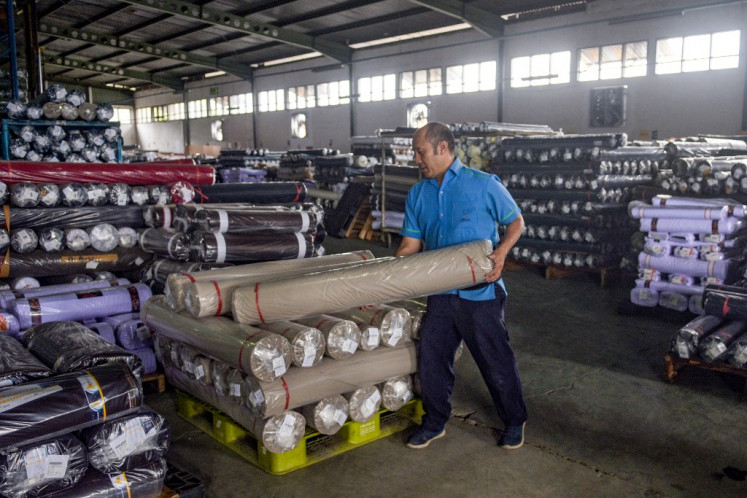Popular Reads
Top Results
Can't find what you're looking for?
View all search resultsPopular Reads
Top Results
Can't find what you're looking for?
View all search resultsBusiness as usual: Employees share stories of being forced to work from the office
Even though the government has imposed a work-from-home policy for nonessential workers, some companies and institutions are running as usual.
Change text size
Gift Premium Articles
to Anyone
E
veryone in nonessential sectors should work from home. The government’s position on this is clear. Unfortunately, a number of offices have chosen to ignore the policy.
Lani, a 26-year-old who works at a governmental institution, said she had been forced to come in to the office as usual. Like the other employees interviewed for this story, Lani has chosen to not to use her real name.
"I feel so anxious and unsafe. It seems to me that my superiors do not care about protecting their employees," she told The Jakarta Post on July 15.
Living in Jakarta, the epicenter of the nation’s COVID-19 outbreak, Lani sighed as she spoke about her office's poor pandemic policies. Not long ago, Lani found out that more than a hundred colleagues had contracted the virus. Still, there were no plans to change the office policy.
"I and many of my colleagues have demanded a lockdown, but [the bosses] have their ears closed,” Lani said.
However, there has been a soft revolt of sorts.
“In the end, we have to save our own lives. Whenever one of our colleagues is infected, every staff member working in the same room will immediately work from home regardless of their superiors' approval," Lani said.
So far, Lina said, there hadn’t been any penalties for employees who had done this.
Indira, a 27-year-old who works in the property division of one of the country’s largest conglomerates, said the company was requiring all employees to come into the office. She said she worried that the constant dread she felt would take a toll on her mental health.
"I’m scared whenever I go to the office. The cases in Jakarta are increasing at a significant pace and my colleagues [who have become infected] are contributing to those statistics,” she said.
Read also: Nearly half of Jakartans may have had COVID-19, serosurvey suggests
Indira tries her best to fend off negative thoughts.
“Every morning, I give myself positive affirmation just to cheer up, yet it's all useless once I arrive at the office. I feel horrible. It's been happening repeatedly. It's stressful, and I worry about my mental health," she said.
Their offices have not provided any explanation of why they need employees to work at the office, and neither of Lani and Indira can make sense of why they would.
"I don't really know the reason,” Indira said. “We’re just employees. They did say that working from the office makes it easier to ‘coordinate’ as we are available on-call whenever they need us.”
Lani was told a “better excuse”, she said sarcastically.
"I feel ashamed saying this, but [the superiors] said we needed to work from the office because we worked in a ‘strategic’ sector. They think we do very important work here. To me, it seems that they don't approve of work-from-home simply because [they] are incapable of using [technological devices]. They say that they don't like to meet online, which is nonsense because almost all of our meetings are held online."
No punishment
On July 3, the government instated emergency public activity restrictions (PPKM Darurat) in response to a surge of COVID-19 cases and deaths. The curbs were initially expected to last until July 20.
Jakarta governor Anies Baswedan said his office would hold surprise health policy inspections. The head of the Labor, Transportation and Energy Office, Andri Yansyah, said there would be punishments for those caught, from temporary closures to business permit revocations.
The Jakarta public order agency (Satpol PP) reported that at least 63 companies had violated PPKM Darurat from July 6 to 12. Fifteen of the offenders were required to close for three days, while 20 received written warnings. Twenty-eight others were forcibly closed.
Lani and Indira had not experienced any such inspections.
"[There has been] no inspection whatsoever,” Lani said. “My office is ‘invisible’. I heard several times that Satpol PP had come to inspect things, but we are still up and running. I have never heard of us receiving any penalties. I heard someone reported our company to JAKI [a public service for reporting policy violations in Jakarta], but nothing happened. I don't know, maybe we have a great lobbyist.”
No way to fight
Do workers made to come to the office despite regulations have any legal recourse?
"Because PPKM Darurat is an emergency order, it is rather difficult to find the solution within our labor laws," Nabiyla Risfa, a labor law expert from Universitas Gadjah Mada (UGM) told the Post. "The ideal way for workers to fight back is through public services such as JAKI in Jakarta."
But not every region, Nabiyla noted, had reporting mechanisms like JAKI. In places without such services, employees should report their company to the local labor office, she said.
"Workers can use the [worker health and safety] principle in the Labor Law. There are no specific rules about pandemic situations, but forcing workers to go to the office during a crisis can be considered putting them in a dangerous situation and can thus can be reported. Working from the office exposes you to COVID-19, so the company is violating [the law’s health and safety provisions]," Nabiyla added.
Reporting an employer is no easy thing, especially when it involves a governmental office.
Read also: Indonesia relaxes emergency curbs, vows to boost testing, tracing
With morale at an all-time low, many employees feel they can only fight through passive resistance.
“We work lazily, at a snail’s pace. In my department, we like to suddenly work from home without notifying any of our superiors,” Lani said.
Indira feels even more hopeless and helpless. She said a few employees had tried talking to the company’s human resources department and board of directors. However, none of the employees’ suggestions were carried out.
Working at the office makes Indira feel she is just waiting for her turn to get infected.
"This is a ticking time bomb, ready to explode. Any of us could be next."











